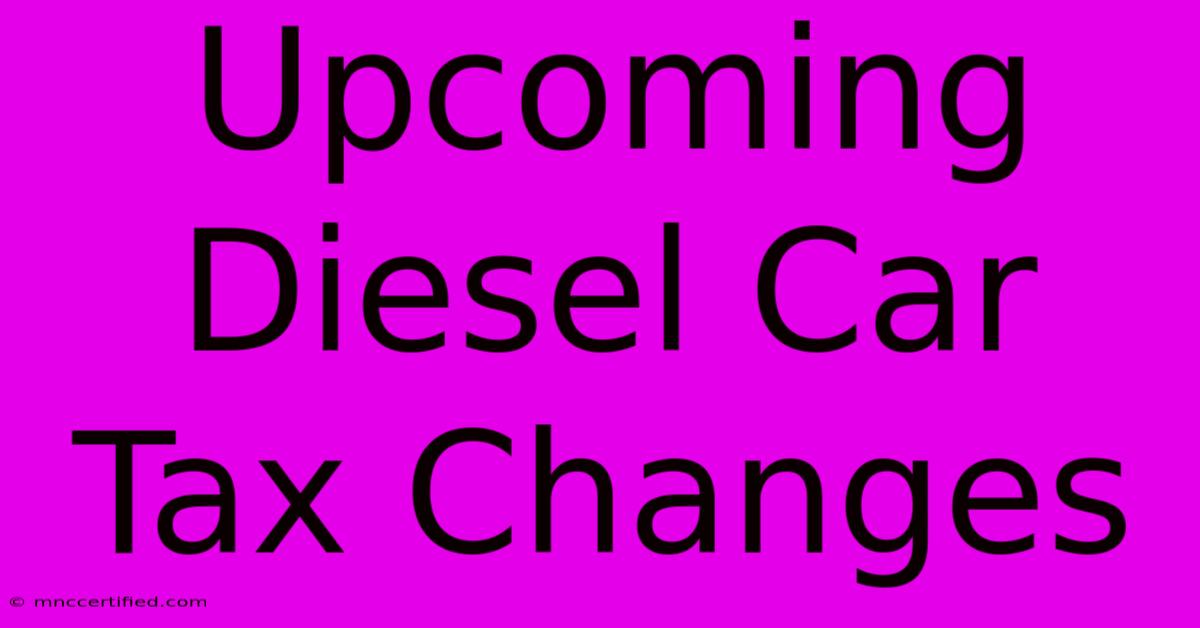Upcoming Diesel Car Tax Changes

Table of Contents
Upcoming Diesel Car Tax Changes: What You Need to Know
Are you a diesel car owner or thinking about buying one? Understanding upcoming diesel car tax changes is crucial. Tax laws are constantly evolving, and failing to stay informed could lead to unexpected costs. This comprehensive guide breaks down the latest information on diesel car tax changes, helping you prepare for what lies ahead.
The Shifting Landscape of Diesel Taxation
For years, diesel cars enjoyed tax benefits compared to petrol cars. However, concerns over air quality and environmental impact have led to a significant shift in government policy. Many countries are implementing changes to level the playing field, or even penalize diesel vehicles. These changes aren't uniform across the globe; understanding your specific region's regulations is critical.
Why the Changes?
The primary driver behind these changes is the higher emission of nitrogen oxides (NOx) from diesel engines compared to petrol engines. NOx is a significant contributor to air pollution, linked to respiratory problems and other health issues. Governments worldwide are increasingly prioritizing cleaner air, leading to stricter emission standards and higher taxation on vehicles that don't meet these standards.
Key Areas Affected by Upcoming Changes:
- Vehicle Excise Duty (VED) / Road Tax: Many countries are increasing VED for diesel cars, particularly older models that don't meet the latest emission standards. Some countries have already implemented higher rates, while others have announced future increases. Check your local government's website for specific details on VED rates for your vehicle.
- Congestion Charges: Cities with congestion charge zones are increasingly targeting diesel vehicles with higher charges or expanding the zones to encompass more diesel-intensive areas. This is driven by a commitment to reducing pollution in urban centers.
- ULEZ (Ultra Low Emission Zones): Many major cities are establishing or expanding ULEZ schemes, imposing daily charges on vehicles that don't meet specific emission standards. These standards are becoming stricter, impacting more diesel vehicles over time. Knowing if your car meets the ULEZ standards for your area is crucial.
- Company Car Tax: Company car tax benefits for diesel cars have largely been eliminated or significantly reduced in several countries. This means higher tax bills for employees driving diesel company cars.
How to Prepare for Upcoming Changes
The best way to prepare is to stay informed. Regularly check your government's website for updates on taxation policies.
Here are some other proactive steps:
- Check your vehicle's emission standards: Understand your car's Euro emission standard (e.g., Euro 6). Newer Euro standards generally mean lower emissions and potentially lower tax implications.
- Consider alternatives: If your diesel car is likely to face substantial tax increases, explore alternative transportation options, including public transport, cycling, or switching to a more fuel-efficient vehicle (petrol hybrid or electric).
- Plan your budget: Factor in potential tax increases when budgeting for your vehicle's running costs.
- Consult a tax advisor: For complex situations or if you're uncertain about the impact of tax changes on your specific circumstances, seek professional advice.
Looking Ahead: The Future of Diesel Cars
While diesel cars still have a place on the roads, their dominance is waning. The trend towards stricter emission regulations and higher taxation is likely to continue. The future favors more environmentally friendly options like hybrid and electric vehicles. Understanding these upcoming changes empowers you to make informed decisions about your vehicle and its future tax implications.
Disclaimer: This article provides general information about upcoming diesel car tax changes. Tax laws are complex and vary by location. Always consult official government sources and/or a qualified tax professional for specific advice related to your situation. This information is for guidance only and does not constitute financial or legal advice.

Thank you for visiting our website wich cover about Upcoming Diesel Car Tax Changes. We hope the information provided has been useful to you. Feel free to contact us if you have any questions or need further assistance. See you next time and dont miss to bookmark.
Featured Posts
-
Gold Bond Promotional Products
Nov 26, 2024
-
Sea Disaster In Egypt Yacht Missing
Nov 26, 2024
-
Who Killed Jon Benet Netflixs Revelation
Nov 26, 2024
-
Smiths Dismissal Trumps Reaction
Nov 26, 2024
-
Macys Expense Scandal 154 Million
Nov 26, 2024